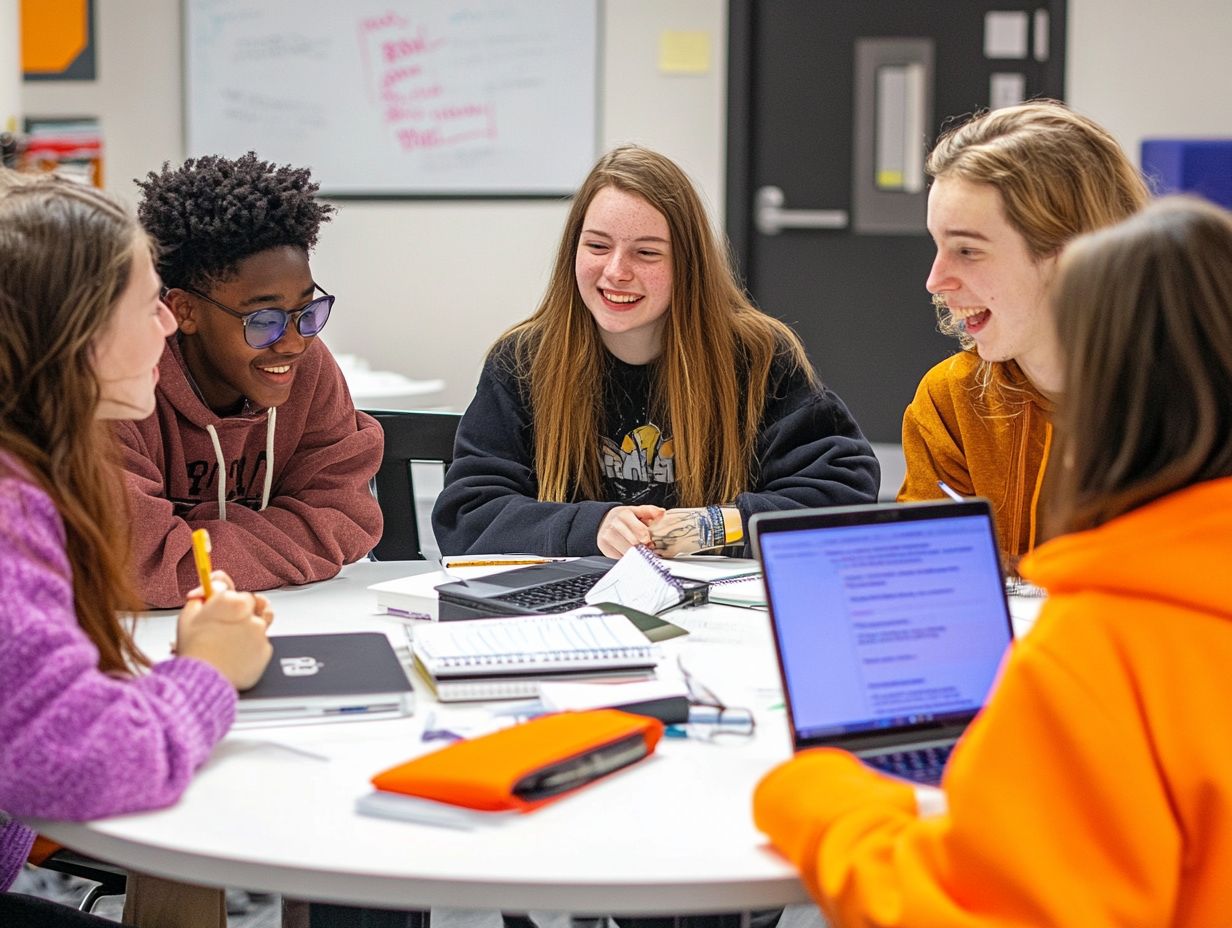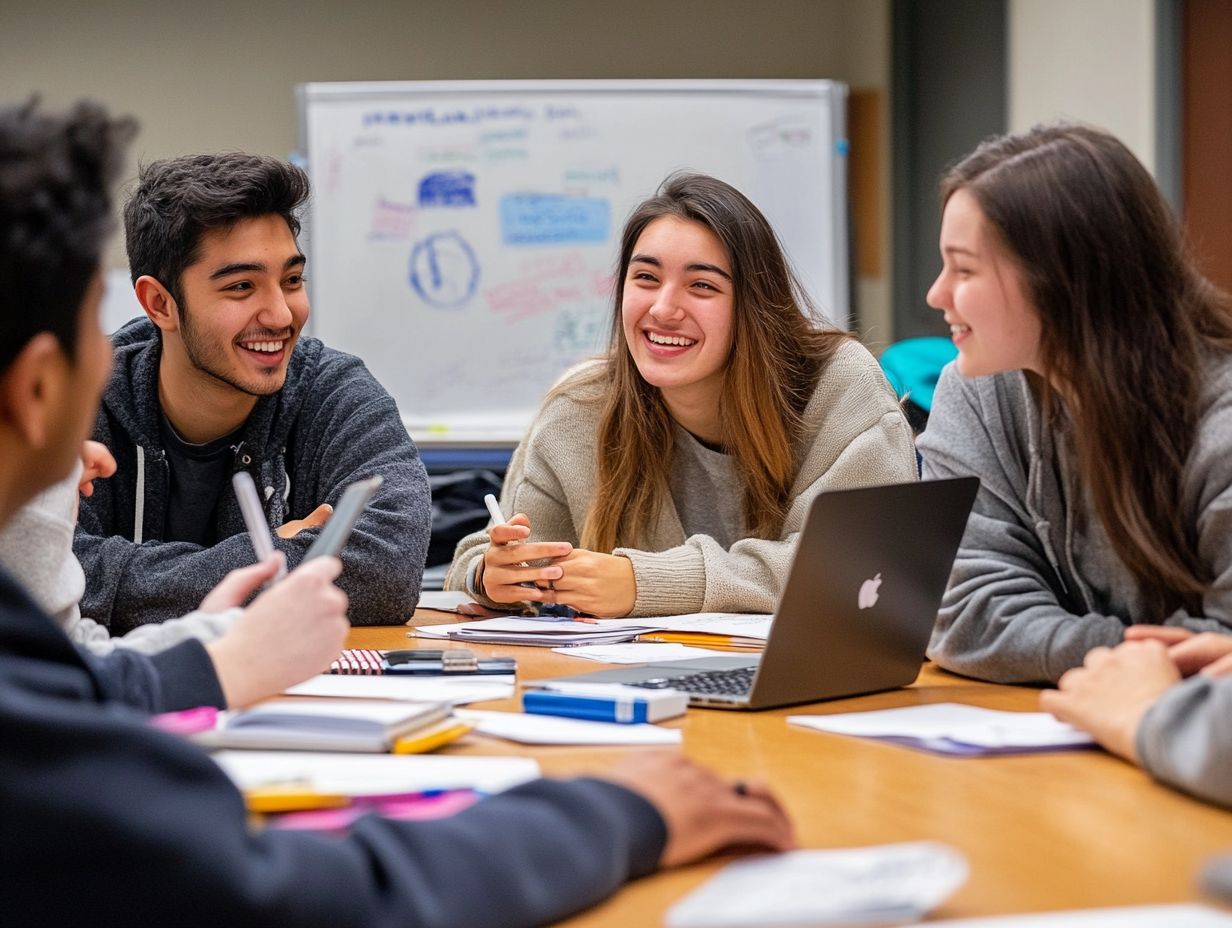what are the benefits of group study for tests?
Group study has emerged as a highly effective way to master academic material, and it s easy to see why.
It creates a team environment where you can deepen your understanding and retention of complex subjects while drawing from various perspectives. It improves problem-solving and thinking skills and enhances motivation and accountability among your peers.
This article explores the numerous benefits of group study, provides tips for conducting effective sessions, and tackles the potential challenges you might encounter. All these aim to help you maximize your study efforts.
Contents
Key Takeaways:

Group study can improve understanding and retention of material. Discussions and explanations from peers provide new perspectives and reinforce concepts. Collaborating with others can enhance problem-solving and thinking skills, as different individuals bring unique insights. Group study can increase motivation and accountability, as members encourage and support each other in staying on track with studying and preparing for tests.
What is Group Study and Why is it Effective?
Group study represents a collaborative way of learning where students gather to refine study skills, engage in critical thinking, and address learning gaps through teamwork and varied perspectives.
By forming study groups, you can exchange knowledge, enhance your study habits, and prepare for real-world challenges, paving the way for academic success and boosting your confidence.
This exciting learning space accelerates your understanding and acts as a remedy for procrastination, motivating you to sidestep distractions while fostering accountability through peer support and effective communication.
Benefits of Group Study for Tests
Group study presents a wealth of advantages, especially regarding academic success. It sharpens study skills, boosts motivation, and fosters collaboration.
By joining forces with fellow students, you can share resources, offer peer feedback, and explore diverse perspectives. This collective effort strengthens understanding and cultivates critical thinking and problem-solving abilities.
This collaboration improves your study sessions, making it an essential strategy for effective test preparation!
Improved Understanding and Retention of Material
One of the primary advantages of group study is the enhanced understanding and retention of material from collaborative learning experiences. When you gather in study groups, you compare notes, tackle challenging concepts, and gain insights from various perspectives that boost your comprehension.
This social interaction solidifies your knowledge and reinforces essential academic skills. During collaborative problem-solving sessions, you can break down complex equations or theories together, leveraging each other’s strengths.
Imagine a group working on a tough math problem; as one person articulates their thought process, others might grasp concepts that previously eluded them. Peer teaching becomes a powerful tool those who master a topic shed light on it for their peers, fostering deeper understanding through explanation.
These discussions often spark questions you might not have considered on your own, enhancing your critical thinking. Psychologically, this interaction fosters a sense of belonging and reduces anxiety, making you more receptive to learning.
When you actively engage in conversations about your studies, you re not just memorizing information you re constructing knowledge in a shared environment, enriching your academic experience significantly. Don’t wait! Join a study group today to elevate your learning!
Enhanced Problem-Solving and Critical Thinking Skills

Group study boosts your problem-solving and critical thinking skills. You’re exposed to various perspectives that challenge your understanding.
Collaborative learning lets you and your peers tackle complex problems. You can offer feedback and use different viewpoints to find effective solutions.
During study sessions, unique challenges spark innovative discussions. For example, one group member may suggest a new approach to a tough math problem. This helps everyone refine their methods and learn from each other’s thought processes.
Helpful feedback that improves your ideas plays a crucial role in this dynamic. This nurturing atmosphere encourages you to explore academic challenges from multiple angles, enriching your learning experience and promoting creative thinking.
Increased Motivation and Accountability
Increased motivation and accountability are key advantages of group study. You often find encouragement from your peers, which keeps you focused and engaged.
When you form study groups, you and your fellow participants become accountability partners. You help each other stay on track with your study routines while fostering a sense of responsibility.
This dynamic promotes effective study sessions and enhances overall productivity. By sharing responsibilities and setting common goals, you create an environment that nurtures discipline and camaraderie.
Within these groups, you can exchange strategies for managing your time effectively. Working alongside others alleviates feelings of isolation and amplifies the psychological benefits of collaborative learning.
The mutual encouragement among peers can spark intrinsic motivation. This makes challenging subjects feel much more manageable.
Establishing clear objectives for each session and using time management techniques can further boost your focus. This ensures that everyone remains engaged and productive.
The synergy in collaborative settings becomes a powerful catalyst for your academic success.
How to Conduct a Successful Group Study Session
To conduct a successful group study session, embrace careful planning, effective communication, and a collaborative spirit. This elevates student engagement.
Start by establishing clear goals and choosing study methods that resonate with the group. It’s essential to coordinate everyone’s schedules so that each member feels involved and accountable.
By fostering an atmosphere of peer support and encouraging open dialogue, you enhance the learning experience for all participants, leading to improved academic outcomes.
Effective Communication and Collaboration Techniques
Effective communication and collaboration techniques are vital for successful group study sessions. They ensure that everyone remains engaged and actively contributes to the learning process.
Incorporating collaborative tools, like shared digital whiteboards or project management applications, can streamline tasks and keep everyone aligned. These platforms allow you and your peers to visualize concepts together, enhancing clarity and focus during discussions.
When conflicts arise, using mediation techniques and active listening can guide the group toward constructive resolutions. This fosters trust and respect among participants.
By creating an environment where each individual feels valued, you encourage the sharing of unique insights. This ultimately enriches the collective learning experience. Healthy discussions, supported by these techniques, boost engagement and deepen understanding among all members involved.
Utilizing Different Study Methods and Tools

Utilizing a variety of study methods and tools can significantly elevate the effectiveness of your group study sessions, offering you diverse techniques to engage with the material.
By incorporating collaborative learning strategies, which include studying together and sharing ideas, you can tailor your sessions to suit your specific learning style and needs. This ultimately leads to more productive and enriching study experiences.
One popular method at your disposal is mind mapping. It allows you to visually organize information, benefiting those who thrive on visual stimuli.
Flashcards are another excellent tool, especially for auditory learners like yourself. They enable you to repeatedly read or recite terms and concepts within a group setting.
Technology-based platforms such as Quizlet and Google Docs facilitate real-time collaboration, enhancing communication and participation among group members.
Each tool caters to various learning styles and encourages you to explore and integrate different educational techniques, helping you understand and remember the material better.
Potential Challenges and Solutions for Group Study
While group study offers a wealth of benefits, it also brings potential challenges that can disrupt your learning experience, such as conflicts, distractions, and issues with group dynamics.
To navigate these challenges successfully, you should adopt strategies that allow you to manage your time effectively, establish clear ground rules, and cultivate a focused learning environment that minimizes disruptions.
Dealing with Conflicts and Distractions
Dealing with conflicts and distractions is essential for maintaining a productive group study environment, as these issues can significantly disrupt your learning process.
By fostering open communication and encouraging peer support, you can effectively address conflicts and minimize distractions, allowing everyone to stay focused on their academic goals.
Establishing clear guidelines from the outset helps set expectations and creates a framework for handling potential disagreements.
Choosing designated study areas that are free from noise and interruptions plays a crucial role in sustaining concentration.
You can enhance your focus by incorporating time management techniques, like setting specific goals for each session.
Actively listening to one another and practicing empathy during discussions can transform potential conflicts into opportunities for constructive dialogue, fostering a collaborative atmosphere.
Nurturing mutual respect transforms your study group into a dynamic learning team, allowing you and your peers to resolve differences while strengthening your teamwork skills, ultimately making the study group more effective.
How to Handle Uneven Contributions and Group Dynamics
Handling uneven contributions and navigating group dynamics is crucial for ensuring that you and your fellow study group members are fully engaged in the learning process.
By cultivating an environment of collaboration and accountability, you can address imbalances and encourage equal participation, elevating your study experience into something truly enriching.
To accomplish this, establishing clear expectations for participation from the very beginning can be remarkably beneficial. Each member should be fully aware of what is expected of them, clarifying roles and enhancing everyone s commitment.
Constructive feedback is a game changer in this scenario; it helps less active participants recognize their value and motivates them to engage more fully.
Peer support becomes essential, as members uplift one another, fostering motivation and a sense of belonging.
Promoting open dialogue about group dynamics ensures that everyone feels valued, enabling each individual to express their thoughts and contribute to the overall success of your collective efforts.
Frequently Asked Questions

What are the benefits of group study for tests?
Group study for tests has several benefits, including:
How does group study help with test preparation?
Group study allows for the sharing of knowledge and understanding of different concepts, making it easier to understand and remember information for tests. To maximize effectiveness, it’s important to follow best practices for group study.
Does group study improve test scores?
Yes, studying in groups can boost your test scores. This happens because sharing ideas helps everyone understand the material better.
What are the advantages of studying in a group?
Group study increases motivation and accountability. You can learn from others and clear up any confusion.
Can group study help reduce test anxiety?
Yes! A supportive group can ease your stress and build your confidence.
Are there any drawbacks to group study for tests?
Group study can be helpful, but it’s crucial to join a focused group. Ensure your personal studying needs are still being met.






